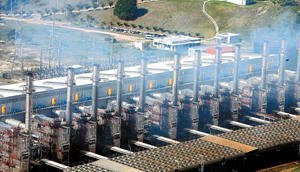
TEGUCIGALPA, HONDURAS
The government, via decree, intended to buy machinery that will eventually become junk.
It would be an unprofitable investment and a new adventure to acquire, at an estimated cost of $ 500 million, the depreciated thermal park of the country through an expropriation process that would also send a negative message to international investors.
Through a bill submitted by the Executive to Congress on Tuesday March 24 this year, a petition was made to legislate in favor of buying at a fair price the thermal plants, and to authorize appropriations to carry out the transaction and to annul the Contract with the Electric Measurement Service of Honduras (SEMEH, for its Spanish acronym).
Critics of the National Electricity Company (ENEE, for its Spanish acronym) suggest that this body, which is weakened by the politicization and patronage of every Government in turn, would be inefficient in the management of the thermal park of the country.
The ENEE, for instance, owns Alstom and Sulzer plants, installed in Puerto Cortés and capable of generating 55 megawatts.
These plants failed to operate since 2004 and despite an impending crisis visualized for the short term, were not able to be run by ENEE.
For that reason it launched a process of direct hiring which was won by Vetasa consortium, a private company.
The thermal companies
Elcosa’s manager, Salomon Ordoñez told El Heraldo that it seems strange the government is interested in buying the thermal park of the country composed of the thermal plants owned by Lufussa, EMCE, ENERSA and Elcosa.
Taken together these companies generate almost 70 percent of the electricity demand of the country.
“The government’s intentions of buying used plants are illogical, because they eventually will scrap due to years of use they have. The government should allocate these resources to develop new investment in hydroelectric generation,” he said.
To install a megawatt of energy in the country, according to Ordoñez, costs between 1.0 and 1.5 million dollars.
Elcosa’s manager estimated that the government would need about $ 500, which are about 10,000 million lempiras, for the appropriation of the thermal plants. However, it would be like “to throw away the money to spend this amount of resources to acquire this machinery, which depends on fossil fuels, in order to generate electricity, and not to invest it in the construction of hydroelectric projects.
“If successful, this initiative would not be the best use of the people’s money, because they would have to hire international credits to purchase these depreciated plants”, said the executive.
The contract for 80 megawatts of generation of Elcosa expires in July 2010 and the Lufussa Uno’s, which produces 40 megawatts, will expire by the end of December of the same year.
Both contracts are considered the most expensive for ENEE’s finances because the plants are fueled with diesel.
“We do not know if the government will decide to extend the term of those contracts, but at the end of its term the government’s obligations will be completed. This money can be invested by the government on the development of renewable projects, “said Ordoñez.
El Heraldo learned that Lufusa UNO no longer generates energy because it is a plant of diesel fuel, whose price is almost similar to that of gasoline.
Even this company located in the south has fired in the course of this year more than 30 of the nearly 350 employees, as part of a restructuring process not yet finished.
Capital Flight
The director of the Honduran Council of Private Enterprise (COHEP, for its Spanish acronym), Benjamin Bográn, said to be firmly opposed to the nationalization of the thermal plants and other industries.
According to Bográn, initiatives like these affect the investment climate in the country and the generation of new jobs.
“Our rulers are far from being aware we are facing a fundamental problem, one that affects the whole country’s economy; they are willing to throw overboard even some achievements such as the reduction in the rate of poverty. He criticized the government is engaged in a political discussion that is creating uncertainty instead of a climate of peace, which is needed to attract investment into the country. “How is it possible to generate more employment in the country if the government is interested in nationalizing companies. For the love of God, how are Hondurans to invest in the country if there are signals against the benefit of the country”, said the director of COHEP.
For the private sector, the news that there are intentions in Honduras of nationalizing companies cause considerable damage to the national investment climate and hinder the arrival of new investment into the country.
Bográn complains the authorities act in this way when there are thousands of workers parading in the offices of the Department of Labor, asking for the calculation of their employment benefits.
“We hear dissonant messages from the government that keep foreign investment away of the country, so it is almost impossible to protect jobs,” said the official.
The director of the Honduran Maquila Association (AHM, for its Spanish acronym), Guillermo Matamoros, said that between January 2008 and March 2009 have been lost in this sector of the economy about 19,000 jobs, as an effect of the international financial crisis.
Without resources
The director of COHEP said the crystallization of the purchase of the thermal plants is unlikely, because the government does not even have the necessary resources to fit the budget of the Republic.
“The State is not a bottomless bag where you put your hand into and take out millions and millions of lempiras. Honduras is a country with a very limited income,” he said.
According to Bográn, the executive and legislative branches are engaged in a political fight, harming the development of all Hondurans.
Taken from El Heraldo.